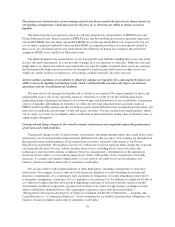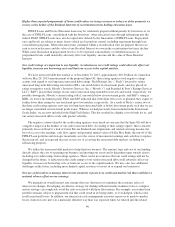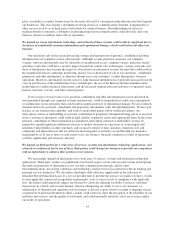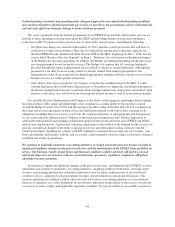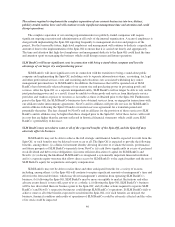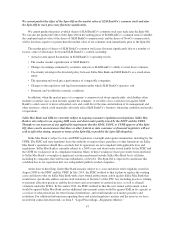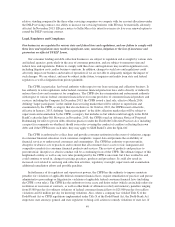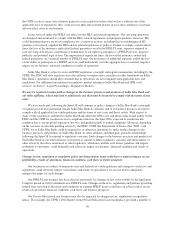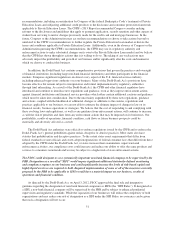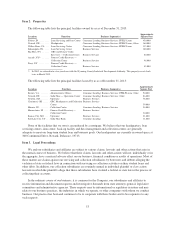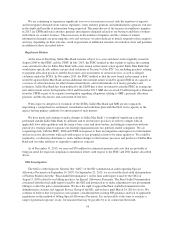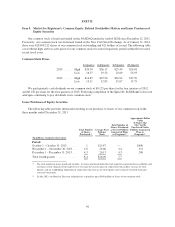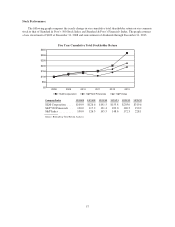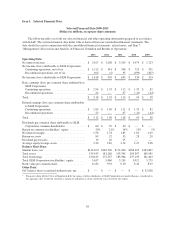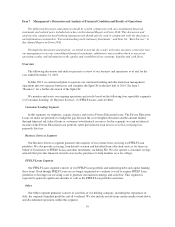Sallie Mae 2013 Annual Report Download - page 51
Download and view the complete annual report
Please find page 51 of the 2013 Sallie Mae annual report below. You can navigate through the pages in the report by either clicking on the pages listed below, or by using the keyword search tool below to find specific information within the annual report.relative standing compared to the three other servicing companies we compete with for account allocations under
the DSLP servicing contract, our ability to increase our servicing business with ED may be materially adversely
affected. In November 2013, ED gave notice to Sallie Mae of its intent to exercise its five-year renewal option to
extend the DSLP servicing contract.
Legal, Regulatory and Compliance
Our businesses are regulated by various state and federal laws and regulations, and our failure to comply with
these laws and regulations may result in significant costs, sanctions, litigation or the loss of insurance and
guarantees on affected FFELP Loans.
Our consumer lending and debt collection businesses are subject to regulation and oversight by various state
and federal agencies, particularly in the area of consumer protection, and are subject to numerous state and
federal laws and regulations. Failure to comply with these laws and regulations may result in significant costs,
including litigation costs, and/or business sanctions. In addition, changes to such laws and regulations could
adversely impact our business and results of operations if we are not able to adequately mitigate the impact of
such changes. We are subject, and may be subject in the future, to inquiries and audits from state and federal
regulators as well as litigation from private plaintiffs.
The CFPB, in particular, has broad authority with respect to our loan servicing and collection business. It
has authority to write regulations under federal consumer financial protection laws and to directly or indirectly
enforce those laws and examine us for compliance. The CFPB also has examination and enforcement authority
with respect to various federal consumer financial laws for some providers of consumer financial products and
services, including the Company. In December 2013, the CFPB issued a final rule, effective March 2014,
defining “larger participants” in the student loan servicing market that will be subject to supervision and
examination by the CFPB, a category that also includes us. In October, 2012, the CFPB issued a final rule,
effective in January, 2013, defining “larger participants” in the debt collection market that will be subject to
supervision and examination by the CFPB, a category that includes us but which would not apply to the SLM
BankCo after the Spin-Off. However, in November, 2013, the CFPB issued an Advance Notice of Proposed
Rulemaking for rules to govern debt collection practices under the Fair Debt Collection Practices Act, including
a request for comments on whether it should issue rules covering the conduct of creditors collecting their own
debts and if the CFPB issues such rules, they may apply to SLM BankCo after the Spin-Off.
The CFPB is authorized to collect fines and provide consumer restitution in the event of violations, engage
in consumer financial education, track consumer complaints, request data and promote the availability of
financial services to underserved consumers and communities. The CFPB has authority to prevent unfair,
deceptive or abusive acts or practices and to ensure that all consumers have access to fair, transparent and
competitive markets for consumer financial products and services. The review of products and practices to
prevent unfair, deceptive or abusive conduct will be a continuing focus of the CFPB. The ultimate impact of this
heightened scrutiny as well as any new rules promulgated by the CFPB is uncertain, but it has resulted in, and
could continue to result in, changes to pricing, practices, products and procedures. It could also result in
increased costs related to servicing and collection activities, regulatory oversight, supervision and examination,
additional remediation efforts and possible penalties.
In furtherance of its regulatory and supervisory powers, the CFPB has the authority to impose monetary
penalties for violations of applicable federal consumer financial laws, require remediation of practices and pursue
administrative proceedings or litigation for violations of applicable federal consumer financial laws (including
the CFPB’s own rules). The CFPB has the authority to issue cease and desist orders (which can include orders for
restitution or rescission of contracts, as well as other kinds of affirmative relief) and monetary penalties ranging
from $5,000 per day for ordinary violations of federal consumer financial laws to $25,000 per day for reckless
violations and $1 million per day for knowing violations. Also, where a company has violated Title X of the
Dodd-Frank Act or CFPB regulations implemented under Title X of the Dodd-Frank Act, the Dodd-Frank Act
empowers state attorneys general and state regulators to bring civil actions to remedy violations of state law. If
49


